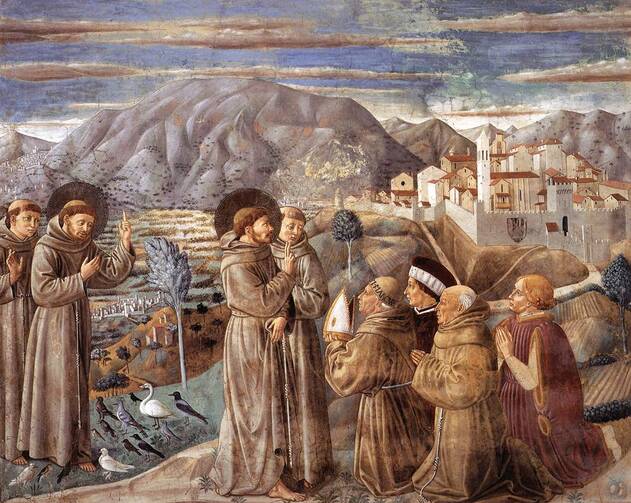A Homily for the Fourteenth Sunday in Ordinary Time
Readings: Ezekiel 2:2-5 2 Corinthians 12:7-10 Mark 6:1-6
St. Francis of Assisi was nearing the end of his life. He had already handed over to others the administration of his new band of brothers. According to his first biographer, Thomas of Celano, “His limbs were failing and his body as good as dead,” but the poverello from Assisi was still “ever thinking how he might set his hand to enterprises of greater perfection, and (like a skilled knight in God’s camp) challenge the foe and kindle new wars.”
Francis was, Thomas wrote, “now complete in grace before God, and shone among the men of this world by his holy deeds,” but he was not content. Indeed, so great was his sense that there was much more to do that Francis often said to his brothers, during these final days, “Let us begin, brethren, to serve the Lord God, for hitherto we have profited little or nothing.”
His friars could certainly be forgiven if they found the saint somewhat irksome in saying this. Most of them had come from money. Like Francis, they were sons of the gentry or the new commercial class. Now they were barefoot and begging for their meals. They might have been tempted to respond in the words of St. Peter to Our Lord: “We have given up everything and followed you” (Mt 19: 27) and then have thrown in “What more do you want?”
Yet Thomas of Celano suggests that Francis said the same more than once in his final days. “Let us begin, brethren, to serve the Lord God, for hitherto we have profited little or nothing.”
St. Mark famously tells us that Jesus was rejected by his own when he preached among them. Our first temptation, whenever we hear the Gospels, is to control the casting. We see ourselves as the disciples who are faithful, who are open to what the Lord is doing. And that leaves those with whom we disagree, who appear to oppose us, to play the parts of those who reject Christ. We are like children who have not yet learned to share. We claim grace for ourselves and assign sin to others.
No one should condone the wrongs that others commit. And there is nothing self-righteous in trying to be clear about what is right and what is wrong. But we have lost the way when attention to the sins of others, awareness of their need for forgiveness, begins to blind us to our own need for repentance.
Spiritually, Francis was a genius. He recognized that, on this side of the grave, while the direction of life remains an open question, we never fully give ourselves to the Lord. We never give all of ourselves to the Lord. Put another way, until we enter the life yet to come, saint or sinner, each of us remains divided within the self.
When I was a kid in high school, here is how I would picture this truth. I imagined my soul to be a land filled with many castles. The Lord Jesus had conquered some of them, enough to claim the realm as his own, but there were still redoubts holding out, areas of my life that I refused to surrender, unrecognized parts of my life that the Lord had yet to claim.
If you belong to the Lord, are there still parts of you that you have failed to surrender? How might you come to see them? Here are a few questions to ponder.
Are you robbed of peace every time you think of some people? Whatever your history with them, whatever wrong they might have done, if you cannot bring them to mind without stressing yourself, some work remains undone. Something is not yet surrendered to the Lord.
Are you unhappy? Most of us would say, not usually but sometimes. Look again at those times. What makes you unhappy? Is your will stymied? Do you feel ignored? Unappreciated? We know the change we want to see in others, but when we are unhappy, we should also consider what we might change about ourselves. Sometimes unhappiness comes from wrong decisions we make about how to view the world. The more we reinforce those decisions, the unhappier we become.
Are you angry? Righteous anger is centered and quickly moves to resolution, like our Lord overturning tables in the temple. Resentful anger lacks focus. It festers within us. It is the potion we brew for another and then drink ourselves. If you recognize resentment within yourself, then a castle needs to fall. Some part of yourself needs to surrender to the Lord.
We do not control the world. Lamenting that fact of life takes us nowhere. We do not even fully control ourselves, but that is the place to start, something that we can offer to the Lord. A spiritual life starts anew each day. Or as St. Francis put it, “Let us begin, brethren, to serve the Lord God, for hitherto we have profited little or nothing.”








